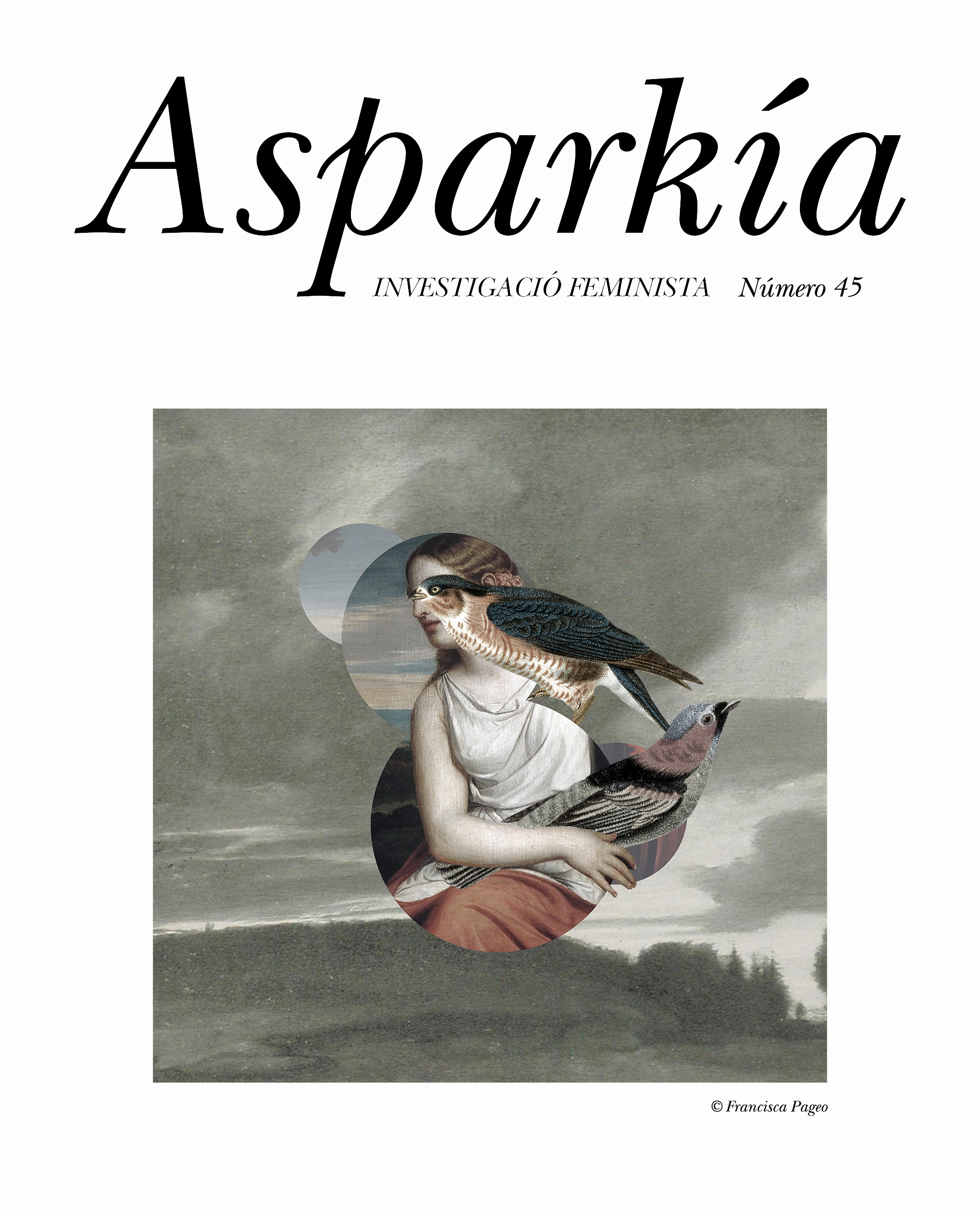Gender Autofictions in Sculptural Practices
Main Article Content
Abstract
This article brings together a series of writings on visual autofictions to argue that work around gender stereotypes and, consequently, processes of experimentation with identities in plastic productions can be part of this creative trend. Alterities observe themselves in a way that can sometimes bifurcate one’s own identity perception, and this is evidenced in numerous trajectories of relevant artists. Cady Noland, Tracy Emin, or Sylvie Fleury demonstrate that the term can be expanded through sculptural and installative works, which are closer to the use of implicit signifiers in materials and processes than to photographic representation.
Downloads
Article Details
References
Akers, Torey. (23 de noviembre de 2019). What Is Masculinity In Art, And Do We Have To
Care? Artspace Magazine. www.artspace.com/magazine/interviews_features/in_depth/what-is-masculinity-inart-and-do-we-have-to-care-56336
Beauvais Lyons, Ellen McClung Berry. (s.f.). Issues Raised by Folk Art Parody. Hokes Archives.
https://volweb.utk.edu/~blyons/spelvinissues.htm
Bloois, Joost de. (2007). The artists formerly known as… or, the loose end of conceptual art
and the possibilities of ‘visual autofiction’. Image and Narrative (19).
https://www.imageandnarrative.be/inarchive/autofiction/debloois.htm
Camarzana, Saioa. (3 de marzo de 2015). Sophie Calle: Mi arte es una ficción real, no es mi vida pero tampoco es mentira. Revista El Cultural. https://www.elespanol.com/el-cultural/arte/20150303/sophie-calle-arte-ficcion-realno-mentira/15248870_0.html
Castro Jorquera, Carolina. (4 de mayo de 2015). La ilusión de decirlo todo (29.771 días).
Artishock. Revista de arte contemporáneo. https://artishockrevista.com/2015/05/04/on-kawara-la-ilusion-decirlo-29-771-dias/
Chadwick, Whitney. (1992). Mujer, arte y sociedad. Editorial Destino.
Chicago, Judy y Schapiro, Miriam. (1973). Female Imagery. Womanspace Journal (14).
Cone, Michelle (1990). Entrevista a Cady Noland. Journal of Contemporary Art, 3 (2), 20-25.
https://static1.squarespace.com/static/54889e73e4b0a2c1f9891289/t/565f4832e4b0b
ffd16366/1449084978763/Cady+Noland+-+Michele+Cone.pdf
Feldman, Robert S. (2008). Desarrollo en la infancia. Cuarta edición. Pearson Educación.
Ferrando, Bartolomé. (2012). Arte y cotidianeidad. Hacia la transformación de la vida en el arte. Editorial Árdora Exprés.
Forastelli, Fabricio. (2002). Masculinidad, homosexualidad y exclusión. Dossiers feministes 6:
Masculinitats: Mites, de/construccions i mascarades, (6), 111-126.
https://raco.cat/index.php/DossiersFeministes/article/view/102446/153636
Francés, Fernando y Pernet, Denis. (2011). Sylvie Fleury [Catálogo de exposición]. Centro de Arte Contemporáneo de Málaga.
Fraser, Morven. (2015). Genres instables: Ludic performances of autofiction in the works of Catherine
Cusset, Philippe Vilain, Chloé Delaume and Éric Chevillard [Tesis doctoral, Universidad de St. Andrews].
Guasch, Ana María. (2000). El arte último del siglo XX. Alianza Editorial.
Kjellman-Chapin, Monica. (2009). Fake Identity, Real Work: Authenticity, Autofiction, and
Outsider Art. SPECS journal of art and culture, 2, 148-159.
https://scholarship.rollins.edu/cgi/viewcontent.cgi?article=1151&context=specs
Lamoni, Giulia. (2008). Dé-couvrir. Écriture et couture dans le discours autofictionnel de
Tracey Emin. Image [&] Narrative, 22.
https://www.imageandnarrative.be/inarchive/autofiction2/lamoni.html
Marlo, David. (2007). Afrofuturism and Post-Soul Possibility in Black Popular Music. African American Review, 41 (4), 695-707.
Mike Kelley. (2014). MoMA PS1. www.moma.org/calendar/exhibitions/3744
Miller, Scot. (2013). Afrosurreal Manifesto: Black Is the New Black—a 21st-Century Manifesto. Black Camera, 5(1), 113-117. https://doi.org/10.2979/blackcamera.13.1.0515
Mulvey, Laura. (1975). Visual pleasure and narrative cinema en Braudy, Leo y Cohen, Marshall (Eds.), Film Theory and Criticism: Introductory Readings (pp. 833-844). Oxford
University Press.
Pires, Leah. (2019). Cady Noland at MMK Frankfurt. Art in America Magazine, 107(4), 83-85.
Pozuelo, José María (2022). Autofiguraciones: de la ficción al pacto de no ficción. Revista
Signa, 31, 673-696. https://10.5944/signa.vol31.2022.29418
Reisz, Susana. (2016). Formas de la autoficción y su lectura. Lexis, 40(1).https://doi.org/10.18800/lexis.201601.003
San Martín, Francisco J. (2011). El mundo como voluptuosidad e hidratación. Revista Arte yParte, (91), 20-41.
Serra Lopes, Francisco. (2008). IKB, une autofiction par Yves Klein. Image [&] Narrative, 22. http://www.imageandnarrative.be/autofiction2/serralopes.htm
Speaks, Elyse. (2011). Space, Gender, Sculpture: Bourgeois, Nevelson, and the Changing
Conditions of Sculpture in the 1950s. Women’s Studies: An inter-disciplinary journal, 40(8),
-1091. http://dx.doi.org/10.1080/00497878.2011.609416
Tapp, Mara. (4 de marzo de 2004). Lee Bontecou Doesn’t Care What You Think. Chicago Reader.
Recuperado de https://chicagoreader.com/news-politics/lee-bontecou-doesnt-carewhat-you-think/
Taylor, Brandon. (2000). Arte hoy. Editorial Akal.
Taylor, Paul. (1987). Sherrie Levine: Entrevistada por Paul Taylor. Flash Art International,
(135). https://flash---art.com/article/sherrie-levine-2/
Tuan, Yi-Fu. (2007). Topofilia. Editorial Melusina.
Worthington, Marjorie. (2016). “Sex-Consciousness” to Self-Consciousness: Second-Wave Feminism and Postmodern Autofiction. Genders, (1:2 Fall 2016).


